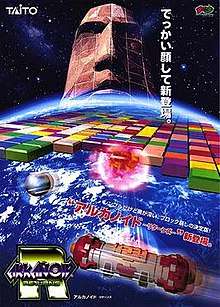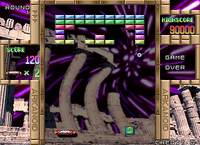Arkanoid Returns
Arkanoid Returns is an arcade game released by Taito Corporation in February 1997 as part of the Arkanoid series. It was the fourth overall, and third to be released in arcades. The game was ported to the PlayStation later the same year,[1] with an updated home release being released afterwards titled Arkanoid R 2000.
| Arkanoid Returns | |
|---|---|
 Japanese promotional sales flyer. | |
| Developer(s) | Taito |
| Publisher(s) | Taito |
| Designer(s) | Kumi Mizobe |
| Series | Arkanoid |
| Platform(s) | Arcade, PlayStation |
| Release |
|
| Genre(s) | Block breaker |
| Mode(s) | Single player, multiplayer |
| Arcade system | Taito F3 System |
| CPU | Motorola 68020 |
Gameplay

The gameplay remains similar to Arkanoid: Doh it Again, the previous game in the series, in that it features the same powerups (with the addition of the brown "G" Giga Ball), some re-used level designs, and the same board size. The initial arcade game contains only 50 levels, the environment changing every 9 levels. A code can be entered before starting the game to begin a new set of 50 levels starting from Level 51, ending with a confrontation with Doh. Arkanoid R 2000 continues onto Round 51 immediately from Round 50, invalidating the need for a code entry, and includes an extra campaign with 100 new levels, several new block types, a rainbow power up (later known as "V" Vanish), and a new worm boss. This release also contained a level editor.
Reception
In Japan, Game Machine listed Arkanoid Returns on their May 1, 1997 issue as being the fifth most-successful arcade game of the year.[2]
References
- "Arkanoid Returns: Brick-Breaking Action Is Back". Electronic Gaming Monthly. No. 101. Ziff Davis. December 1997. p. 104.
- "Game Machine's Best Hit Games 25 - TVゲーム機ーソフトウェア (Video Game Software)". Game Machine (in Japanese). No. 540. Amusement Press, Inc. 1 May 1997. p. 21.